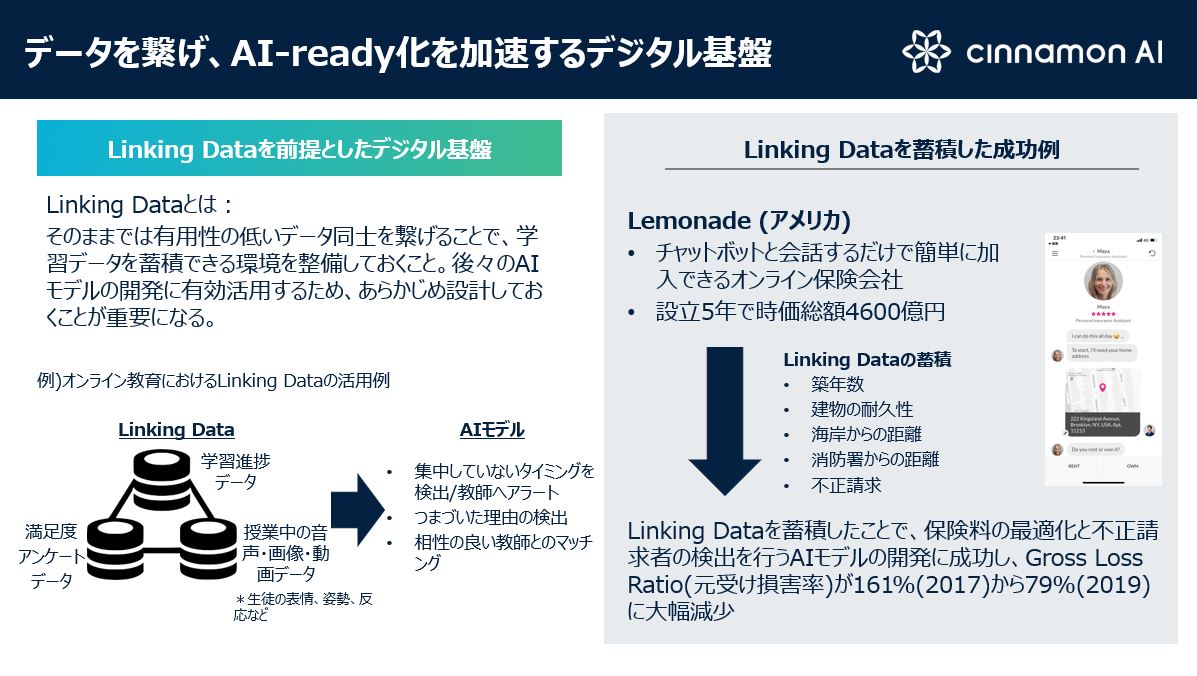
blog cinnamon blog

- management
What is the need for "Linking Data" that will determine the success or failure of future businesses?

■Data can be made more useful by “connecting” it
Both companies and governments will be unable to avoid the use of AI in the future. What is important, then, is how to store the training data that will be applied to the AI model.
To a greater or lesser extent, companies accumulate a variety of data obtained through their business activities. However, it is meaningless to just keep them lying around. In preparation for the use of AI, it is necessary to replace half-dead stock data with "usable data."
Therefore, the other day, at the joint meeting of the Strategic Headquarters for the Advancement of an Advanced Information and Telecommunications Network Society (78th Meeting) and the Public-Private Data Utilization Promotion Strategy Council (9th Meeting), I proposed the development of a digital infrastructure based on Linking Data. I made a suggestion.

Linking Data refers to the state in which existing data is linked together for the purpose of developing AI models. Even if the data is not useful on its own, it can become effective learning data for AI by accumulating and linking it together.
Let's take the business model of an online English conversation class as an example. If you just leave the video and audio of the lesson scene as is, it will just be a recorded video. However, what if you conducted a survey of students after each class about their level of satisfaction with the class, and linked the results with the lesson video? AI will be able to automatically predict trends in satisfaction based on students' facial expressions and reactions.
If such an AI model becomes a reality, it will be possible to provide real-time feedback to the teacher about students' reactions as the class progresses. What happens then?
"It seems that not much is understood about what I just said, so let me explain it in a little more detail."
"The lectures seem to be getting a little monotonous, so let's introduce a different approach to the lesson."
"Today's teaching method seems to be effective, so I'll continue to use it next time."
In this way, receiving recommendations from AI to improve teaching methods and increase student satisfaction should be a major advantage over competitors. In other words, linking lesson videos and satisfaction levels creates extremely valuable data.
■Loss ratio reduced by half in 2 years! Case study of non-life insurance company Lemonade
Let's take a look at some examples of actual use of Linking Data.
Lemonade, an American online non-life insurance company, offers a service that allows you to complete the enrollment process in just a few minutes by simply interacting with an AI chatbot called Maya. The most noteworthy user experience (UX) is that in addition to the enrollment process, even in the event of an emergency such as a fire, insurance benefits are paid within minutes simply by interacting with Maya.
With traditional insurance companies, insurance claims are generally paid only after several months, after going through a number of complicated processes such as contacting a call center and submitting required documents. Due to this overwhelming UX, Lemonade was listed on the stock market five years after its establishment, and its market capitalization quickly grew to reach approximately 460 billion yen.
The superiority of Lemonade's business model is clear when looking at the loss ratio (*ratio of insurance claims paid to premiums earned).
The loss ratio in 2017 was 161%, which means that for every 100,000 yen of insurance premiums paid by members, Lemonade paid 161,000 yen of insurance claims. At this stage, as the number of subscribers increased, profits and losses increased, and the business was in a state of flames.
However, in the following year, 2018, the loss ratio rose to 113%, and last year it fell to 79%. In other words, Lemonade has rapidly become profitable over the past two years, which means that Lemonade's business model has been completed.
So, how did Lemonade succeed in drastically reducing its loss ratio from 161% to 79% in just two years? The answer is simple. While Lemonade was increasing the number of subscribers, it was busy accumulating data.
The age of the building, durability, distance from the fire station, etc. We strive to collect all kinds of data related to risk, use AI to analyze which properties pay more premiums, and which properties can reduce payments, and personalize insurance premiums for each subscriber. That's what I did. Linking Data was utilized here.
Currently, there is no company in Japan's non-life insurance industry that is utilizing AI at this level. However, Japan, which is said to be a disaster-prone country, should have a lot to learn from Lemonade's example.
■Streamline knowledge inheritance
Many of you may be aware of this, but some messenger tools, which have rapidly become more popular during the coronavirus pandemic, display a survey asking about your level of satisfaction as soon as the meeting ends.
Was clear communication maintained? Were you ever disturbed by noise? How did you feel about the convenience of the interface? This is also a familiar example of creating Linking Data by collecting user ratings. A good example is that companies that are good at using AI are already collecting data on a daily basis.
Again, the important thing is to prepare existing data by converting it into Linking Data. If you can't find any usable data, the first thing to do is to start collecting important numbers and indicators, and both of these tasks should be something you can start right away. If you remain vague and think, ``AI is still a long way off...'' when the time comes, you may end up with no training data at hand to utilize.
Especially now that the baby boomer generation, known as the ``2030 problem,'' is approaching retirement, Linking Data has an important meaning as part of knowledge management.
Even in the manufacturing industry, which has supported Japan's economic growth, there are few cases in which existing materials and reports are effectively utilized, and highly useful knowledge and know-how remain in the minds of departing human resources. I often hear that there are only a few left. It is no exaggeration to say that if we continue into the 2030s, Japanese industry will suffer huge losses and fall into a critical situation.
In other words, the preparation of Linking Data will also lead to a significant reduction in the effort and time required to inherit knowledge. Even if you try to learn from past cases and the know-how of your predecessors when some kind of trouble occurs, if that information is not compiled as Linking Data, you will not be able to respond quickly.
Furthermore, even with the web media that you access on a daily basis, there are many businesses that measure reader abandonment rates based on the amount of text, number of images, content, etc. per piece of content. Currently, this data is only used as reference data for creating content that is more read, but if we take this one step further, AI will be able to automatically create hit articles.
For example, when an author is writing a blog, AI will give advice such as ``It's time to insert subheadings'' or ``Please be careful as there is a lot of text'' to reduce the exit rate. This is not a story of the distant future.
We recommend that you start by reconsidering what kind of data exists around you.
 Cinnamon AI President and CEO Mirai Hirano Serial Entrepreneur. Completed graduate school at the University of Tokyo. Engaged in research on recommendation engines, complex networks, clustering, etc. It was twice selected for the IPA Unexplored Software Creation Project in 2005 and 2006. Founded Naked Technology while still in school. We develop and operate middleware that allows you to develop applications on IOS/ANDROID/flip phones. In 2011, the company was sold to Mixi. Received various domestic and international awards including ST.GALLEN SYMPOSIUM LEADERS OF TOMORROW, FORBES JAPAN “Entrepreneur Ranking 2020” BEST10, Woman of the Year 2019 Innovative Entrepreneur Award, VEUVE CLICQUOT BUSINESS WOMAN AWARD 2019 NEW GENERATION AWARD . He has also given a keynote speech at AWS SUMMIT 2019, Milken Institute Japan Symposium, 45th Japan-ASEAN Management Conference, Bloomberg THE YEAR AHEAD Summit 2019, etc. Since 2020, he has been appointed as a member of the Cabinet Secretariat IT Strategy Office and a special member of the Cabinet Office Tax Investigation Committee. In her private life, she is a mother of two children. Cinnamon AI President and CEO Mirai Hirano Serial Entrepreneur. Completed graduate school at the University of Tokyo. Engaged in research on recommendation engines, complex networks, clustering, etc. It was twice selected for the IPA Unexplored Software Creation Project in 2005 and 2006. Founded Naked Technology while still in school. We develop and operate middleware that allows you to develop applications on IOS/ANDROID/flip phones. In 2011, the company was sold to Mixi. Received various domestic and international awards including ST.GALLEN SYMPOSIUM LEADERS OF TOMORROW, FORBES JAPAN “Entrepreneur Ranking 2020” BEST10, Woman of the Year 2019 Innovative Entrepreneur Award, VEUVE CLICQUOT BUSINESS WOMAN AWARD 2019 NEW GENERATION AWARD . He has also given a keynote speech at AWS SUMMIT 2019, Milken Institute Japan Symposium, 45th Japan-ASEAN Management Conference, Bloomberg THE YEAR AHEAD Summit 2019, etc. Since 2020, he has been appointed as a member of the Cabinet Secretariat IT Strategy Office and a special member of the Cabinet Office Tax Investigation Committee. In her private life, she is a mother of two children. |
At Cinnamon AI, we help you connect AI to your competitive strategy through consulting, workshops, and solutions. We would appreciate it if you could feel free to contact us.
Click here to contact us => Inquiry form
Recommended articles
-
 management
management -
 management
managementPurpose formulation and harvest loop based on customer experience
Purpose formulation and harvest loop based on customer experience
-
 management
managementThe concept of “Expert-in-the-Loop” where humans and AI work together
The concept of “Expert-in-the-Loop” where humans and AI work together
